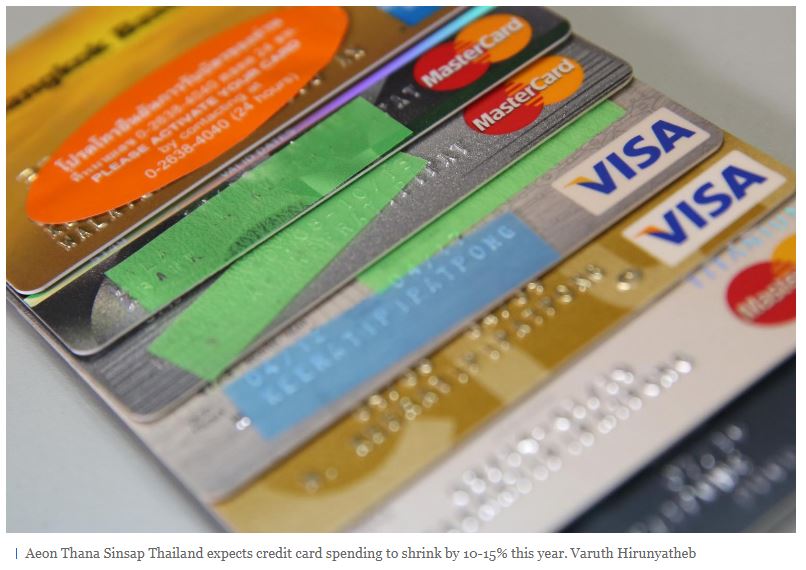Vietnam: Credit card spending headed for 2020 decline
Annual credit card spending is expected to contract this year because of the coronavirus crisis, particularly for outbound spending, due to the government’s prohibition on cross-border travel.
Credit card spending in the finance industry contracted by 14.2% year-on-year for the first five months this year.
The shrinkage gradually improved from 40.1% in April to 27.6% in May and 4.5% in June.
Aeon Thana Sinsap Thailand, a Japan-based non-bank company, expects credit card spending to shrink by 10-15% throughout this year after booking a nearly 10% contraction on a year-to-date basis.
The company expects its credit card business to have endured the most impact and bottomed out in its first quarter, covering March to May based on Japanese accounting practices, said director Nuntawat Chotvijit.
For the first quarter, Aeon booked income derived from its credit card business of 1.73 billion baht, down 7% year-on-year.
The drop in revenue from credit cards was attributed to a slump in credit card spending, mainly caused by the pandemic.
Mr Nuntawat forecasts a marginal rebound in credit card spending in the second half against the backdrop of an economic downturn.
Credit card spending for tourism-related categories, especially outbound tourism, will contract in light of the government’s prohibition on cross-border travel to contain the outbreak.
Other types of spending for tourism-related categories, including hotels, airlines and restaurants, will be sluggish, Mr Nuntawat said.
For the second half, the company will focus on civil servants, who have faced reduced impact from the pandemic, while concentrating on the higher business potential of medical personnel.
The company will pay more attention to online shopping and food delivery for higher card spending.
An interest-rate cut for both credit cards and personal loans, per the Bank of Thailand’s guidelines under debt relief measures, has also affected the company’s interest income, Mr Nuntawat said.
The measure will, however, help contain a rise in non-performing loans (NPLs), he said. Customers applying for a suspension of principal and interest payments represent about 5% of the total client base.
Despite the prospects of higher NPLs, the company expects to manage bad debts at a controllable level by year-end. Outstanding NPL ratio of total loans stood at 3.7% as of May.
“We have no plan to adjust the criteria on loan approval,” Mr Nuntawat said. “But loan accessibility for borrowers will decline in line with their lower debt-servicing ability.”
Despite greater prospects for credit card spending in the second half, annual credit card spending is projected to tumble by 10% year-on-year, said Nayanee Peaugkham, managing director of Ayudhya Capital Services.
The crisis has seen the company’s credit card spending contract by 13% year-on-year in the first half, Ms Nayanee said.
Chutidej Chayuti, chief financial officer of Krungthai Card, said the company is revising its business target for the year, given that credit card spending has been curbed by the pandemic and lethargic economic conditions.
Despite retaining the existing growth rate of credit card spending at 10% this year, KTC believes upholding positive growth momentum amid the downside risks will be difficult.
KTC booked credit card spending worth 90.6 billion baht for the first six months of the year, down 9.6% year-on-year.
The contraction rate improved from a 10.7% year-on-year decline in the first five months, due to the government’s forbearance programme and consumers resuming their normal card spending.
The company reckons that the NPL ratio already peaked at 6.6% in June.
In the second half, the company’s business operations will experience downside risks from the slowdown and uncertainty over the pandemic.
The central bank’s forbearance measures in the second phase, cutting the ceiling rate for credit cards from 18% to 16% and the personal loan rate from 28% to 25%, will also dampen the company’s profitability, Mr Chutidej said.
KTC plans to focus on a new loan product, called KTC P Berm, comprising title loans for automobiles and motorcycles, picofinance and nanofinance.
Source: https://www.bangkokpost.com/business/1967431/credit-card-spending-headed-for-2020-decline


 Thailand
Thailand




